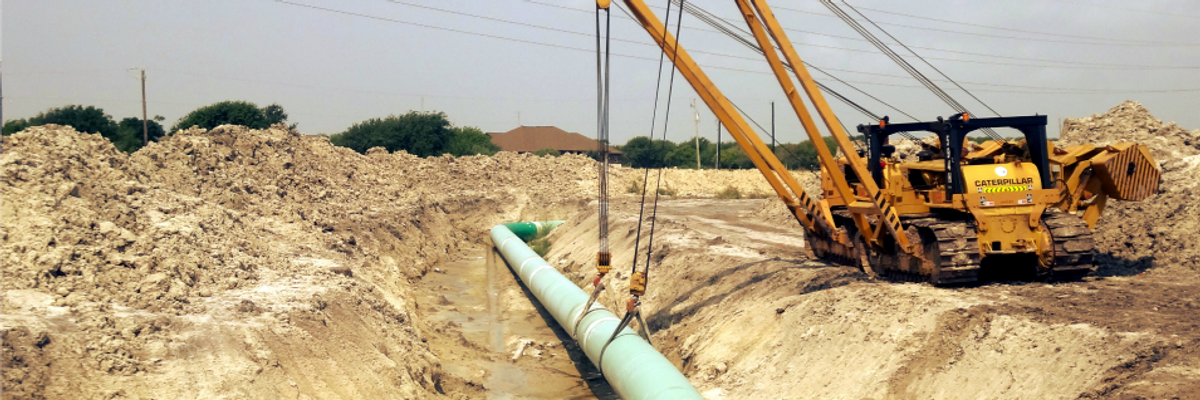
The Trump administration's rollback of the National Environmental Policy Act (NEPA) would allow fossil fuel companies to largely bypass a federal review process for new pipeline projects. (Photo: Jay Phagan/Flickr/cc)
Green Groups Denounce Trump Rule Change That Takes 'Chainsaw to a Bedrock Environmental Law'
"These changes mean polluting corporations will have an easier time doing whatever they want, wherever they want, with even less consideration for climate change."
Conservation and climate action groups condemned President Donald Trump's "unprecedented" rollback Thursday of a 50-year-old law which made history when it was passed in 1970 by allowing communities to have a say in federal infrastructure projects that would affect local resources and ecosystems.
Trump on Thursday proposed major changes to the National Environmental Policy Act (NEPA), which requires that major construction plans for pipelines, power plants, bridges, and other infrastructure projects undergo a detailed assessment to consider their impact on the environment before approval.
"Today, Trump is taking a chainsaw to a bedrock environmental law that has protected Americans for decades," said Rebecca Concepcion Apostol, U.S. program director at Oil Change International. "This is a reckless, dangerous, blatant gift to the fossil fuel industry that will have dire consequences for all of us."
The rollback of NEPA, called an "international treasure" by one former EPA official, will allow the fossil fuel industry to quickly get approval for new projects that could send climate-warming, pollution-causing emissions into surrounding communities, as well as harm wildlife habitats and federally protected lands, with scant oversight.
The move is "nothing more than another attempt by the administration to tip the scale in favor of industry," said Theresa Pierno, president and CEO of the National Parks Conservation Association (NPCA).
"This law has given people a voice in how their public lands are used, and ensures the environment, from the air we breathe to the water we drink, is taken into account before development projects move forward," Pierno added. "These unprecedented revisions deliberately ignore years of science-driven data, letting the government and industry off the hook for addressing the impacts of climate change on our national parks."
The Natural Resources Defense Council (NRDC) explained the groundbreaking effect NEPA has had on American communities for decades.
"In short, NEPA protected people by making sure those who were affected by these projects had a voice," tweeted the group.
Trump's proposed changes, which will be subject to a 60-day comment period, would narrow the scope of NEPA reviews by redefining the term "major federal action" to reduce the number of projects that are required to undergo review. The rollback would also restrict public input by imposing a strict time limit for reviews, allowing just one year for many projects and two years for the largest projects.
While the Obama administration expanded NEPA by ordering the government to consider projects' possible impacts on the climate crisis, Trump is proposing that courts will no longer have to consider the cumulative climate effects of infrastructure projects.
"These changes mean polluting corporations will have an easier time doing whatever they want, wherever they want, with even less consideration for climate change or local concerns than they've shown so far," Rep. Raul Grijalva (D-Ariz.), chairman of the House Natural Resources Committee, told the New York Times.
Gina McCarthy, a former EPA administrator under the Obama administration who is now the head of the NRDC, called the rollback a "dangerous move" that the group was committed to fighting against.
The revisions "deliberately ignore years of science-driven data about the climate crisis and the effects of pipeline and other fossil fuel projects," Pierno said.
"Across the country, rising sea levels, melting glaciers, and intensifying storms and wildfires are already destroying our national parks, which are home to countless historic and cultural resources," she added. "But the administration's deliberate steps to undermine science and expertise will only make matters worse. We need solutions to tackle the climate crisis now, not reforms that make it easier to stick our heads in the sand."
The environmental law group Earthjustice urged Americans to honor the legacy of those who pushed to pass NEPA into law by speaking out during the federal comment period--which officially begins on Friday.
"This law was built on decades of activism from people who wanted a say in decisions affecting their health, their lives, their communities, and their environment," said Stephen Schima, senior legislative counsel at Earthjustice. "By stacking the deck for corporate polluters and eviscerating public participation, this administration is trashing that legacy."
"Protect your voice and speak out against this proposal today," the group tweeted.
An Urgent Message From Our Co-Founder
Dear Common Dreams reader, The U.S. is on a fast track to authoritarianism like nothing I've ever seen. Meanwhile, corporate news outlets are utterly capitulating to Trump, twisting their coverage to avoid drawing his ire while lining up to stuff cash in his pockets. That's why I believe that Common Dreams is doing the best and most consequential reporting that we've ever done. Our small but mighty team is a progressive reporting powerhouse, covering the news every day that the corporate media never will. Our mission has always been simple: To inform. To inspire. And to ignite change for the common good. Now here's the key piece that I want all our readers to understand: None of this would be possible without your financial support. That's not just some fundraising cliche. It's the absolute and literal truth. We don't accept corporate advertising and never will. We don't have a paywall because we don't think people should be blocked from critical news based on their ability to pay. Everything we do is funded by the donations of readers like you. Will you donate now to help power the nonprofit, independent reporting of Common Dreams? Thank you for being a vital member of our community. Together, we can keep independent journalism alive when it’s needed most. - Craig Brown, Co-founder |
Conservation and climate action groups condemned President Donald Trump's "unprecedented" rollback Thursday of a 50-year-old law which made history when it was passed in 1970 by allowing communities to have a say in federal infrastructure projects that would affect local resources and ecosystems.
Trump on Thursday proposed major changes to the National Environmental Policy Act (NEPA), which requires that major construction plans for pipelines, power plants, bridges, and other infrastructure projects undergo a detailed assessment to consider their impact on the environment before approval.
"Today, Trump is taking a chainsaw to a bedrock environmental law that has protected Americans for decades," said Rebecca Concepcion Apostol, U.S. program director at Oil Change International. "This is a reckless, dangerous, blatant gift to the fossil fuel industry that will have dire consequences for all of us."
The rollback of NEPA, called an "international treasure" by one former EPA official, will allow the fossil fuel industry to quickly get approval for new projects that could send climate-warming, pollution-causing emissions into surrounding communities, as well as harm wildlife habitats and federally protected lands, with scant oversight.
The move is "nothing more than another attempt by the administration to tip the scale in favor of industry," said Theresa Pierno, president and CEO of the National Parks Conservation Association (NPCA).
"This law has given people a voice in how their public lands are used, and ensures the environment, from the air we breathe to the water we drink, is taken into account before development projects move forward," Pierno added. "These unprecedented revisions deliberately ignore years of science-driven data, letting the government and industry off the hook for addressing the impacts of climate change on our national parks."
The Natural Resources Defense Council (NRDC) explained the groundbreaking effect NEPA has had on American communities for decades.
"In short, NEPA protected people by making sure those who were affected by these projects had a voice," tweeted the group.
Trump's proposed changes, which will be subject to a 60-day comment period, would narrow the scope of NEPA reviews by redefining the term "major federal action" to reduce the number of projects that are required to undergo review. The rollback would also restrict public input by imposing a strict time limit for reviews, allowing just one year for many projects and two years for the largest projects.
While the Obama administration expanded NEPA by ordering the government to consider projects' possible impacts on the climate crisis, Trump is proposing that courts will no longer have to consider the cumulative climate effects of infrastructure projects.
"These changes mean polluting corporations will have an easier time doing whatever they want, wherever they want, with even less consideration for climate change or local concerns than they've shown so far," Rep. Raul Grijalva (D-Ariz.), chairman of the House Natural Resources Committee, told the New York Times.
Gina McCarthy, a former EPA administrator under the Obama administration who is now the head of the NRDC, called the rollback a "dangerous move" that the group was committed to fighting against.
The revisions "deliberately ignore years of science-driven data about the climate crisis and the effects of pipeline and other fossil fuel projects," Pierno said.
"Across the country, rising sea levels, melting glaciers, and intensifying storms and wildfires are already destroying our national parks, which are home to countless historic and cultural resources," she added. "But the administration's deliberate steps to undermine science and expertise will only make matters worse. We need solutions to tackle the climate crisis now, not reforms that make it easier to stick our heads in the sand."
The environmental law group Earthjustice urged Americans to honor the legacy of those who pushed to pass NEPA into law by speaking out during the federal comment period--which officially begins on Friday.
"This law was built on decades of activism from people who wanted a say in decisions affecting their health, their lives, their communities, and their environment," said Stephen Schima, senior legislative counsel at Earthjustice. "By stacking the deck for corporate polluters and eviscerating public participation, this administration is trashing that legacy."
"Protect your voice and speak out against this proposal today," the group tweeted.
Conservation and climate action groups condemned President Donald Trump's "unprecedented" rollback Thursday of a 50-year-old law which made history when it was passed in 1970 by allowing communities to have a say in federal infrastructure projects that would affect local resources and ecosystems.
Trump on Thursday proposed major changes to the National Environmental Policy Act (NEPA), which requires that major construction plans for pipelines, power plants, bridges, and other infrastructure projects undergo a detailed assessment to consider their impact on the environment before approval.
"Today, Trump is taking a chainsaw to a bedrock environmental law that has protected Americans for decades," said Rebecca Concepcion Apostol, U.S. program director at Oil Change International. "This is a reckless, dangerous, blatant gift to the fossil fuel industry that will have dire consequences for all of us."
The rollback of NEPA, called an "international treasure" by one former EPA official, will allow the fossil fuel industry to quickly get approval for new projects that could send climate-warming, pollution-causing emissions into surrounding communities, as well as harm wildlife habitats and federally protected lands, with scant oversight.
The move is "nothing more than another attempt by the administration to tip the scale in favor of industry," said Theresa Pierno, president and CEO of the National Parks Conservation Association (NPCA).
"This law has given people a voice in how their public lands are used, and ensures the environment, from the air we breathe to the water we drink, is taken into account before development projects move forward," Pierno added. "These unprecedented revisions deliberately ignore years of science-driven data, letting the government and industry off the hook for addressing the impacts of climate change on our national parks."
The Natural Resources Defense Council (NRDC) explained the groundbreaking effect NEPA has had on American communities for decades.
"In short, NEPA protected people by making sure those who were affected by these projects had a voice," tweeted the group.
Trump's proposed changes, which will be subject to a 60-day comment period, would narrow the scope of NEPA reviews by redefining the term "major federal action" to reduce the number of projects that are required to undergo review. The rollback would also restrict public input by imposing a strict time limit for reviews, allowing just one year for many projects and two years for the largest projects.
While the Obama administration expanded NEPA by ordering the government to consider projects' possible impacts on the climate crisis, Trump is proposing that courts will no longer have to consider the cumulative climate effects of infrastructure projects.
"These changes mean polluting corporations will have an easier time doing whatever they want, wherever they want, with even less consideration for climate change or local concerns than they've shown so far," Rep. Raul Grijalva (D-Ariz.), chairman of the House Natural Resources Committee, told the New York Times.
Gina McCarthy, a former EPA administrator under the Obama administration who is now the head of the NRDC, called the rollback a "dangerous move" that the group was committed to fighting against.
The revisions "deliberately ignore years of science-driven data about the climate crisis and the effects of pipeline and other fossil fuel projects," Pierno said.
"Across the country, rising sea levels, melting glaciers, and intensifying storms and wildfires are already destroying our national parks, which are home to countless historic and cultural resources," she added. "But the administration's deliberate steps to undermine science and expertise will only make matters worse. We need solutions to tackle the climate crisis now, not reforms that make it easier to stick our heads in the sand."
The environmental law group Earthjustice urged Americans to honor the legacy of those who pushed to pass NEPA into law by speaking out during the federal comment period--which officially begins on Friday.
"This law was built on decades of activism from people who wanted a say in decisions affecting their health, their lives, their communities, and their environment," said Stephen Schima, senior legislative counsel at Earthjustice. "By stacking the deck for corporate polluters and eviscerating public participation, this administration is trashing that legacy."
"Protect your voice and speak out against this proposal today," the group tweeted.

